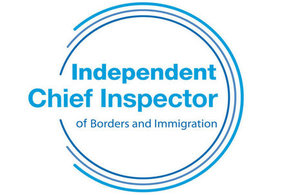An inspection of Home Office outsourced contracts, July to November 2015
The Chief Inspector has released his inspection of escorted and non-escorted removals and Cedars pre-departure accommodation.

ICIBI logo
The Home Office has outsourced a number of its borders and immigration functions to private contractors. The effectiveness and efficiency of such functions, and the Home Office’s management of the relevant commercial contracts, fall within the Independent Chief Inspector of Borders and Immigration’s statutory remit. As such, it is right that they should be subject to inspection in the same way and with the same rigour as borders and immigration functions delivered entirely from within the Home Office.
The public sector’s use of private contractors is of abiding interest to many people. There is a reasonable expectation that where functions have been outsourced they are being delivered to a high standard in terms of quality, consistency and value, and that this can be demonstrated.
With these points in mind, this inspection examined 3 areas of Immigration Enforcement’s (IE) business that had been outsourced, each contributing to the enforced removal from the UK of migrants with no right to remain. Three of these are part of the same process: the escorting of migrants to the country to which they are being returned; and the provision of travel tickets for escorts and returnees, including those returned unescorted. The third concerns Cedars, the pre-departure accommodation (PDA) opened in 2011 for families with children under the age of 18 subject to enforced removal.
In 2013, the Cabinet Office had identified how the management of commercial contracts across the Civil Service needed to improve, and the inspection found that the Home Office had made the recommended improvements, including introducing formal senior oversight of major contracts, recruiting staff with commercial expertise and changing contract monitoring to involve both operational and commercial managers. An external review commissioned by the Home Office in 2014 had pointed to other areas that needed to be addressed, such as an over-reliance on contractor data and contractors’ self-reporting on performance. The inspection found that this remained an issue.
All the contracts inspected pre-date 2013. Over their life, the contractors and the Home Office had identified elements of the contracts that did not work for them and proposed various adjustments. Where accepted, these were pragmatic and struck a balance between the interests of the contractor and those of the Home Office. However, the parties were generally slow to resolve their issues and reach agreement. The Home Office must learn from experience when agreeing the terms of any new contracts in this area, in particular with regard to performance standards, and must move more swiftly when delivery is not meeting operational needs.
The report makes 8 recommendations:
-
In order to reduce the logistical difficulties and additional costs created by late changes to escorted removals, work with Tascor to improve the usefulness of the Electronic Request Form (ERF) for risk assessing escorted removals and allocating escorts, and consider what of the additional information provided at the 72 hour point could be provided earlier.
-
Regularly review by business area and/or removal category the percentage of, and reasons for, cancelled or failed removals, including those deemed ‘out of [Home Office] control’, and set a common threshold, and develop guidance for caseworkers, for when to request refundable tickets.
-
Put in place (and monitor) a process that ensures that where travel tickets have been purchased for an unescorted or escorted removal and the removal is cancelled or fails: * the caseworker updates the Case Information Database (CID) and alerts the travel services contractor at the earliest opportunity (so that the contractor can seek the maximum possible refund) * escorts deployed out of hours and at week-ends alert the travel services contractor at the earliest opportunity, and the escorting contractor confirms to the caseworker that this has been done.
-
Given the co-dependencies of the escorting and travel services contracts, consider re-designating the latter ‘Tier 1’ and reviewing both together at senior level, where relevant applying the lessons from Moore Stephens and other reviews to both.
-
Having relaxed the current performance regime and reduced Tascor’s losses for the remainder of the current escorting contract, press Tascor to deliver as required in relation to the ‘significant efficiency improvements’ to the removals process envisaged in the Joint Business Plan.
-
Conduct a detailed analysis of the operational and financial impacts of delays between the date requested for a removal and the date when escorts are made available, using the results to improve the effectiveness of current processes and to inform future performance measures, including financial deductions (‘service credits’).
-
In designing the performance regime for the new escorting and travel services contract(s), ensure that: * KPIs focus on outcomes, striking a balance between operational delivery and costs (including refunds) and do not distort performance by an over-emphasis on certain activities (for example, In-Country Escorting (ICE) movements) * the number of KPIs is manageable for all parties * performance data can be monitored and validated independently (where necessary through Home Office direct access to contractors’ systems and full data sharing) * any deductions (for example, ‘service credits’) and conditions (for example, sliding scales, caps) are correctly applied and used to incentivise continuous improvement and, where appropriate, collaboration between contractors.
-
Conduct a fundamental review of the requirement for pre-departure accommodation for families with children under the age of 18, with a view to providing facilities, including welfare and other essential support, that are appropriate in scale, nature and cost to the projected demand for and proven value of such accommodation.
The report was sent to the Home Secretary on 2 February 2016.
The Home Office response to the Chief Inspector’s report on outsourced contracts